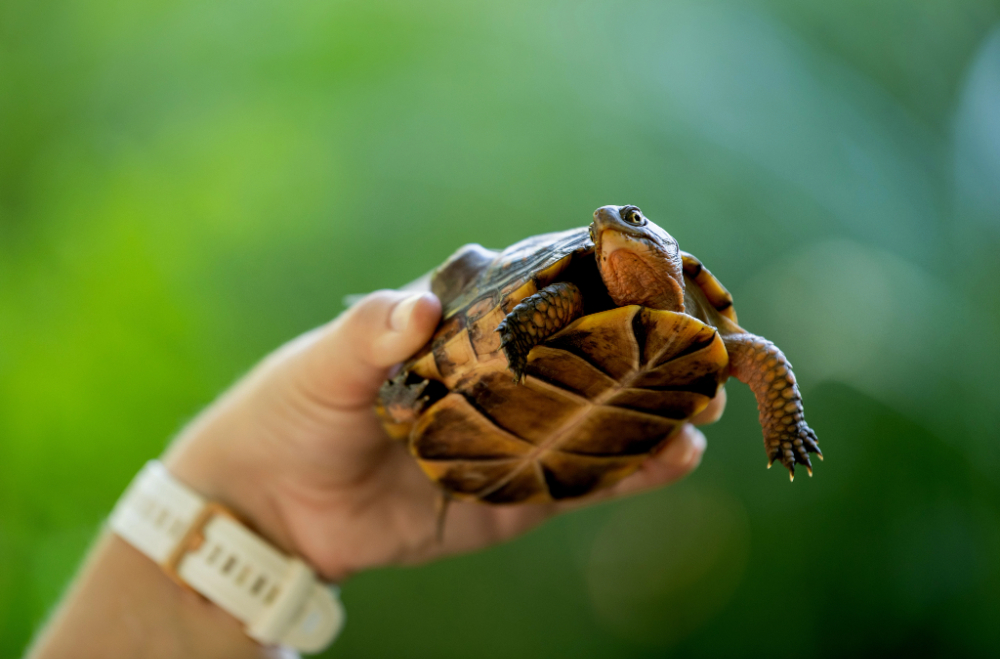Preveterinary Medicine
Undergraduate Major
Allendale • Face to face • 120 Credits

Undergraduate Major
Allendale • Face to face • 120 Credits
Preveterinary medicine offers thorough preparation for students aiming to enter veterinary school and pursue careers in animal health and welfare.
Grand Valley State University equips students with the essential knowledge and skills needed for veterinary school admission. Students receive personalized guidance from experienced advisors who help them navigate the prerequisites and application process for veterinary schools. The program's strong emphasis on academic excellence and practical experience ensures that graduates are well-prepared for the challenges of veterinary education.
The curriculum includes core biology courses along with specialized subjects such as biochemistry, microbiology, organic chemistry, and physics. These courses are designed to provide a solid foundation in the sciences, ensuring that students meet the rigorous requirements of veterinary schools. Additionally, students have opportunities to participate in research projects and gain hands-on experience through laboratory work and field studies.
The university's state-of-the-art facilities, including advanced laboratories, provide an excellent environment for learning and research. You will benefit from the support of a dedicated advising team and the opportunity to join the Grand Valley Preveterinary Club, which offers networking, mentoring, and professional development opportunities.
gvsu.edu/biology
3300a
Kindschi Hall of Science
Dr. Joseph J. Jacquot
(616)
331-2470
[email protected]
Diagnose, treat, or research diseases and injuries of animals. Includes veterinarians who conduct research and development, inspect livestock, or care for pets and companion animals.
Top skills| Annual Earnings | Percentile |
|---|---|
| $ 71,549.75 | 10% |
| $ 87,178.60 | 25% |
| $109,085.35 | 50% |
| $152,166.11 | 75% |
| $181,018.93 | 90% |
Feed, water, and examine pets and other nonfarm animals for signs of illness, disease, or injury in laboratories and animal hospitals and clinics. Clean and disinfect cages and work areas, and sterilize laboratory and surgical equipment. May provide routine postoperative care, administer medication orally or topically, or prepare samples for laboratory examination under the supervision of veterinary or laboratory animal technologists or technicians, veterinarians, or scientists.
Top skills| Annual Earnings | Percentile |
|---|---|
| $ 29,075.15 | 10% |
| $ 33,371.61 | 25% |
| $ 36,371.94 | 50% |
| $ 39,278.03 | 75% |
| $ 48,431.63 | 90% |
Perform medical tests in a laboratory environment for use in the treatment and diagnosis of diseases in animals. Prepare vaccines and serums for prevention of diseases. Prepare tissue samples, take blood samples, and execute laboratory tests, such as urinalysis and blood counts. Clean and sterilize instruments and materials and maintain equipment and machines. May assist a veterinarian during surgery.
Top skills| Annual Earnings | Percentile |
|---|---|
| $ 36,410.94 | 10% |
| $ 38,712.30 | 25% |
| $ 46,455.19 | 50% |
| $ 50,784.29 | 75% |
| $ 59,742.39 | 90% |
Grand Valley State University offers a wide variety of merit-based
scholarships. For information on all of the scholarships that are
available to students, please visit Scholarships at GVSU.
Grand Valley offers myScholarships
(a scholarship matching tool) to help admitted students match
with GVSU scholarships, as well as external scholarship opportunities.
myScholarships will prompt you to answer questions to help match you
to scholarships for which you might qualify.
Getting involved and staying engaged with our vibrant campus community help you make the most of your Grand Valley experience. Attending student life events, joining a student organization, or participating in campus recreation opportunities are all fantastic ways to maximize your college years:
Whether you are a first-year student, a transfer student, or a current student thinking about your career options, advising is an important part of your academic journey.